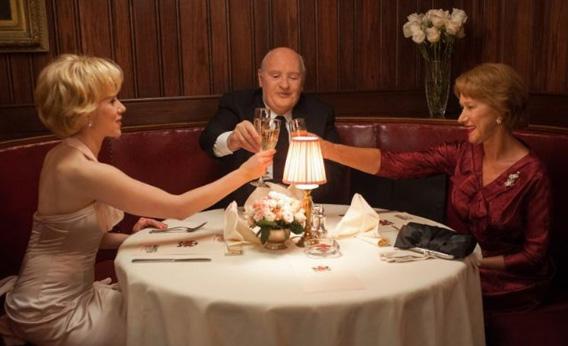Sacha Gervasi’s Hitchcock is a pleasant but unambitious, small-scale biopic, not dissimilar in spirit from last year’s My Week with Marilyn. It reconstructs and freely fictionalizes a brief period in its famous subject’s life, never really aspiring (or daring) to offer much more than a blurred but generally flattering snapshot of the complicated, difficult person at its center. I wouldn’t recommend Hitchcock to cinephiles seeking a bold new take on the master’s life or work, but if all you want is to while away the afternoon in the company of some excellent actors in plummy period costume, Gervasi’s film is not without its pleasures.
For truth in advertising’s sake, Hitchcock (scripted by John McLaughlin from a book by Stephen Rebello) should have been called The Hitchcocks. More than a portrait of the phlegmatic filmmaker himself, it’s a portrait of his marriage to Alma Reville Hitchcock, who was credited as a co-screenwriter on some films (Suspicion, Shadow of a Doubt) and collaborated, closely but anonymously, on nearly all of them. Alma had a reputation as an unerring script adviser and an eagle-eyed viewer—upon viewing a near-final cut of Psycho, she was the only one to notice that Janet Leigh, who was supposed to be dead on the shower floor, had swallowed before the camera cut away.
As played by the dryly witty and drop-dead sexy Helen Mirren, Alma is both Hitch’s intellectual equal and his biggest fan—even if she is getting fed up, not just with her professional invisibility, but with her husband’s tendency to overeat, drink too much, and pine over headshots of cool blond actresses while she sleeps alone in her twin-size bed. But when Hitch, fresh from the critical and commercial success of North by Northwest, gets it into his head to commission a script based loosely on the Robert Bloch novel Psycho (which was in turn based on the grisly real-life story of murderer Ed Gein), everyone from Alma to his agent Lew Wasserman (Michael Stuhlbarg) to the head of Paramount Studios tries to convince him it’s a sick, unmarketable, possibly career-killing idea. This only increases Hitch’s commitment to making the picture, and he eventually gets Alma to agree to self-finance the movie, risking their lavish Bel Air mansion in the process.
As the Psycho shoot gets under way, Hitch and Alma are drawn into separate not-quite romances: He’s nursing a grudge against the actress Vera Miles (Jessica Biel) for having withdrawn from the lead in Vertigo after getting pregnant. Ever one for tormenting his leading ladies, Hitch gives Miles a small role in Psycho in order to alternately tease and ignore her while flagrantly crushing on his new star, Janet Leigh (Scarlett Johansson). As for Alma, she’s working on a script for a non-Hitchcock film with the smooth-talking younger screenwriter Whitfield Cook (Danny Huston), who rents the two of them a beachside “writing cottage” that looks better suited to afternoon delight than to literary collaboration.
These obstacles thrown in the way of the Hitchcocks’ domestic happiness can feel at once melodramatic and trivial, as if the screenwriter simply needed to give the Hitchcocks something to do while we wait for them to realize both the primacy of their marriage bond and the deep interdependency between his work and hers. Unfortunately, since copyright restrictions forbade either the use of any images from Psycho or the literal recreation of such images, the on-set scenes also prove vaguely unsatisfying (though Gervasi does think of a few clever workarounds, framing well-known shots from slightly different points of view).
Hitchcock errs in yoking its realistic showbiz narrative to a bizarre recurring fantasy that has Hitchcock sharing unsettling confidences with the psychotic grave robber Ed Gein (Michael Wincott). It’s unclear whether Hitchcock experiences these as creative daydreams, invasive nightmares, or both, but whatever tone of macabre whimsy Gervasi was shooting for in these scenes never quite lands, and you find yourself dreading the murky lighting and faux-Bernard Herrmann music (actually composed by Danny Elfman) that presages a Gein appearance.
James D’Arcy does an uncanny Anthony Perkins in a powerful audition scene (though not much more is required of him than that, since the character soon all but disappears) and Kurtwood Smith continues his career-long roll as the go-to heavy, playing an MPAA censor whom Hitch must convince to release the film despite its then-unprecedented levels of nudity and gore.
Director Gervasi, who directed the sweet-spirited rock documentary Anvil! The Story of Anvil, is at his best when he chills out on the self-conscious stylistic touches (fantasy sequences, direct address to the camera, etc.) and lets Hopkins and Mirren as the prickly, warring, but ultimately loyal Hitchcocks have at it. Hopkins’ performance, though not an out-and-out impersonation—his speech is measurably faster than the director’s froglike croak—is pleasurably broad, even a little campy. Encased in a latex fat suit, eating foie gras by the tinful, he plays the master of suspense as a vulnerable neurotic whose great strength was his ability to mine that neurosis for his art. As for Mirren, she knows exactly what sort of movie she’s in—a lightweight show-business romance with snazzy period costumes, a TV-ready happy ending, and a few scenes that give her a chance to cut the acting rug (for the first time in their careers!) with Anthony Hopkins. She’ll be damned if she isn’t going to enjoy every minute of it, and as long as she’s on screen, so do we.
